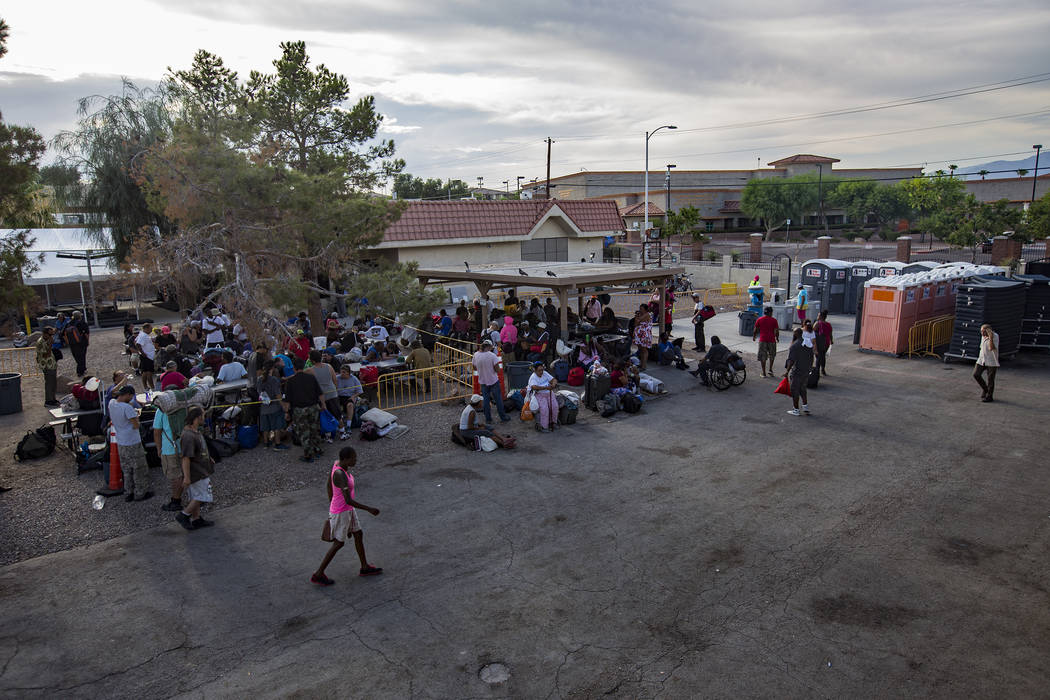COMMENTARY: Homeless in Las Vegas
I am living the stigma of homelessness. I have been homeless seven times in five cities, from East to West. Each time, I would find a way to survive, usually with the help of friends. I would find a job then, after a time, the combination of alcohol and mental illness would cause me to lose my job. I am intelligent, persistent and a hard worker. I’ve traveled the world and been president of a national union. I’ve made a difference in others’ lives, but I can’t save myself.
After losing my job in San Antonio, a friend invited me to Las Vegas. I worked in hospitality, so it seemed like a good fit. The only problem was that my friend changed her mind while I was on my 32-hour bus journey. So I arrived in Las Vegas with nowhere to go and not nearly enough money to start a new life.
I found the Catholic Charities shelter, and at least I was safe. My first month there, I had to dispose of most of my property, my wallet was stolen while I was asleep and a guy walked up and snatched my glasses off my face thinking I was filming him.
As time went on, I found my way and my routine: Up at 6 a.m. to the sound of the guard banging a metal bunk with his flashlight; in line to retrieve my bag from the night-shelter storage, now smaller as I had to dispose of most of my property to fit their size requirements. I then waited in line to turn in my bag for the day-shelter storage. At 10 a.m., I had my one meal for the day, another one-hour line. Then at 3 p.m. it was time to line up to go upstairs. I was one of the lucky ones who had a disabled card, so I didn’t have to wait in line on Main Street until 6 p.m. Fourteen hours in my bunk with no food, the routine to be repeated the next morning.
So to be homeless in a shelter is to experience the best it can be. Most stay on the street, either to keep their property, to maintain their habit of drinking or other ways of self-medicating or because they find the shelter rules unreasonable. It’s an impossible way of life. Over time, the soul-crushing routine combined with the chaos of the crowd diminishes you in a way that is likely to be permanent. Despite the “training” YouTube videos telling us that all we need is a positive attitude, you learn that hope is a dangerous thing. Members of the staff do the best they can, I suppose, but their real job is to control us and maintain order.
That Thanksgiving, I developed a bad earache. The day-shelter manager told me going to the hospital was a waste of time, as they wouldn’t do anything. I asked a security guard to call 911. He told me to find a pay phone and call myself. A couple of days later, my fever spiked, and I collapsed on the way up to my bunk. I was hospitalized for a week and suffered a hearing loss. The nurses had to treat me for malnourishment, as I had no appetite for food after living on one small meal a day. I will never forgive the shelter for the callous way they treated me. Later, they even dropped and broke my laptop, simply saying that it fell off the shelf on its own. As a writer, I miss that laptop every day.
The police are the enforcers on the street. Homelessness is a “quality of life” crime. They chase away anyone wanting to offer us food and give out jaywalking tickets with a gusto on a street with virtually no traffic. They know we can’t pay. To the government and society, homelessness is a problem because we can be seen. The shelter exists not to help us but to keep us off the street. Most who survive and find a job return. The majority never survive, simply existing by panhandling, as their minds deteriorate and any hope for a normal life vanishes. On the first of the month, the shelter is only half full, as many receive a disability check and return after they gamble their money away.
There are no easy solutions to the homelessness problem. I don’t believe housing cures all, as we became homeless due to addiction or mental illness which, combined with income inequality, makes our lives unmanageable.
I was lucky. I needed open-heart surgery and because the surgeon wouldn’t treat me until I had stable housing, I found help with Wellcare. Now I live in bridge housing, thanks to HELP of Southern Nevada, at a Siegel Suites until an apartment is found for me. Recently they found me an apartment, but the complex claimed I was listed as a sex offender. After I showed them my clean record, they say they believe their third party vendor rather than Metro. The wait continues.
The homeless are not going away, but society’s attitude can change and real solutions can be found despite limited resources. First, promote values that remove the stigma of the extreme poverty that is homelessness. Second, treat us like citizens who need help, not as a law enforcement problem. Third, accept that no one would choose this lifestyle. We didn’t choose homelessness, we are a victim of it.
The homeless should be treated like a constituency of citizens with special needs. We need to be heard, not talked about. We are human beings who over time got lost and could no longer function in normal society. We are not easy to look at or avoid, but we desperately need your help. And that begins with understanding who we are.
Ron Moore writes from Las Vegas.

















